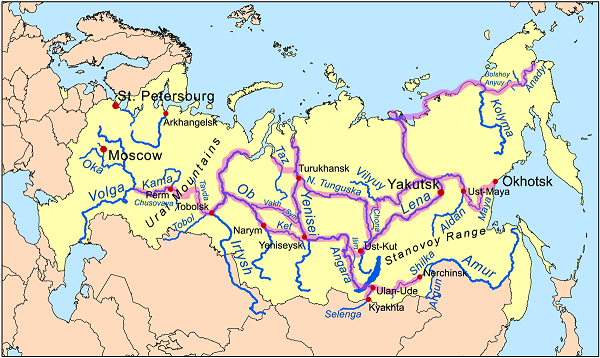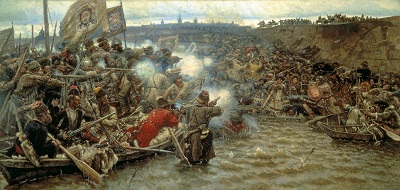We have satiated our vengeance,” they said. “It is time to turn back. New combats will be dangerous for us, since very soon we shall be unable to conquer any more for lack of fighters.”
Continuing The Cossacks Conquer Siberia,
our selection from History of the Russian State by Nikolay M. Karamzin published in 1826. The selection is presented in six easy 5 minute installments.
Previously in The Cossacks Conquer Siberia.
Time: 1581
Place: Siberia

CC BY-SA 3.0 image from Wikipedia.
The third combat, on the Irtysh, was bloody, and stubbornly fought. It cost some companions of Yermak their lives, and served to prove how dear even to barbarians is the independence of their fatherland; for the defenders of Siberia displayed resolution and intrepidity. Nevertheless, they yielded the victory to the Russians toward the end of the day, awaiting a new battle, and without losing either courage or hope. The blind Kutchum left the fortifications in order to camp upon the Tchuvache mountain. Mahmetkul was intrusted with the guard of the intrenchments, and the Cossacks, who the same evening captured the little town of Atik-Murza, dared not take repose for fear of an attack.
Already the troops of Yermak were visibly diminished. Some Cossacks had been killed and many wounded, and amid constant fatigues a great number of them had no strength or valor left. The leaders profited by this night of unrest to hold a council on the course to take, and in this consultation the voice of the weaklings was heard.
“We have satiated our vengeance,” they said. “It is time to turn back. New combats will be dangerous for us, since very soon we shall be unable to conquer any more for lack of fighters.”
“Brothers,” answered the leaders, “there is left only one road for us, and that is the one in the front of us. The rivers are already covered with ice. In turning our backs, we shall perish amid the snows. And if we were fortunate enough to get home to Russia, we should arrive there with the tarnish of perjury, for we have pledged ourselves to conquer Kutchum or to blot out our faults by a generous death. We have lived long with a dishonored reputation. Let us know how to die after having acquired a glorious one! It is God who awards the victory, and often to the weaker, blessed be his name!”
“Amen!” responded the troop. At the first rays of the sun the Cossacks hurled themselves on the intrenchments through a cloud of arrows, crying, “God is for us!” The enemy themselves threw down their palisades at three different points. The Siberians rushed out sabre or lance in hand, and engaged in a hand-to-hand conflict which was disadvantageous for the warriors of Yermak, who were too inferior in numbers. Men fell on all sides: but the Cossacks, Germans, and Poles formed an unshakable wall, loaded their guns in good order, and, by a sustained attack, thinned the ranks of the enemy, whom they drove toward their intrenchments. Yermak and Koltzo, at the first line, accomplished prodigies of valor, repeating in a loud voice, “God is for us!” while the blind Kutchum, placed upon the mountain, in the midst of his imams and his mollahs, invoked Mahomet for the salvation of his true believers.
Happily for the Russians, Mahmetkul, being wounded, was obliged to quit the fight, and the mirzas carried him in a skiff to the other bank of the Irtysh. At this news, consternation spread throughout the hostile army. Deprived of its leader it despaired of victory. The Ostiak princes take flight. They are followed by the Tartars. And Kutchum, learning that the Christian banners are already floating over the intrenchments, seeks his safety in the deserts of Ischim, having hardly had time to remove a part of his treasure from his capital city. This general and bloody battle decided the domination of the Russians from the chain of Ural Mountains to the shores of the Obi and the Tobol. It cost the Cossacks one hundred seven of their bravest warriors, and up to the present day prayers for the repose of their souls are offered in the Cathedral of Tobolsk.

Public domain image from Wikipedia.
On October 27th Yermak, already illustrious for history, after returning thanks to heaven, made his triumphant entry into the town of Isker, or Sibir, situated on an elevation on the bank of the Irtysh. It was defended on one side by intrenchments and a deep moat; on the other, by a triple rampart. According to the annalist, the conquerers found immense riches in gold, silver, Asiatic cloth of gold, precious stones, furs, and so forth, which they shared among themselves like brothers. The town was entirely deserted. These warriors, who had just conquered a kingdom, did not see a single inhabitant here. They glutted themselves with gold and sables, and lacked for food. Nevertheless, three days later, they saw the Ostiaks arrive, led by their prince Bohar, who came to bring them presents and provisions, to take the oath of fidelity, and to ask for mercy and protection. Soon there also appeared a great number of Tartars with their women and children. They were accorded a gracious reception by Yermak. He quieted them and let them return to their camps, after demanding from them a small tribute.
This man, recently the leader of a band of brigands, who had just showed himself to be an intrepid hero and a skilful captain, likewise employed his extraordinary genius in matters relating to administration and to military discipline. He inspired rude and savage peoples with an extreme confidence in a new power. He succeeded by a just severity in curbing his turbulent companions-in-arms, so that they dared not practise any vexations in a country conquered by their boldness and through a thousand dangers, at the extremity of the world. It is related that the inflexible Yermak, managing the Christian warriors in the combats, treated them with rigor for the least fault, and that he punished disobedience and fornication equally with death. He not only exacted complete submission from his whole troop, but also purity of soul, in order to render himself agreeable to the master of the earth and to the Master of heaven, persuaded that God would accord him the victory with a small number of virtuous warriors, rather than with a large number of hardened sinners. “His Cossacks,” says the annalist of Tobolsk, “led a chaste life, on the march as well as during their stay in the capital of Siberia. Their battles were followed by prayer.” But they were not yet at the end of their dangers.
| <—Previous | Master List | Next—> |
More information here.

Leave a Reply
You must be logged in to post a comment.